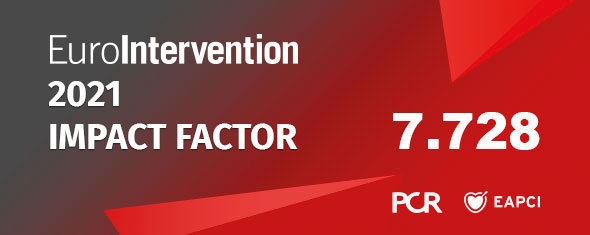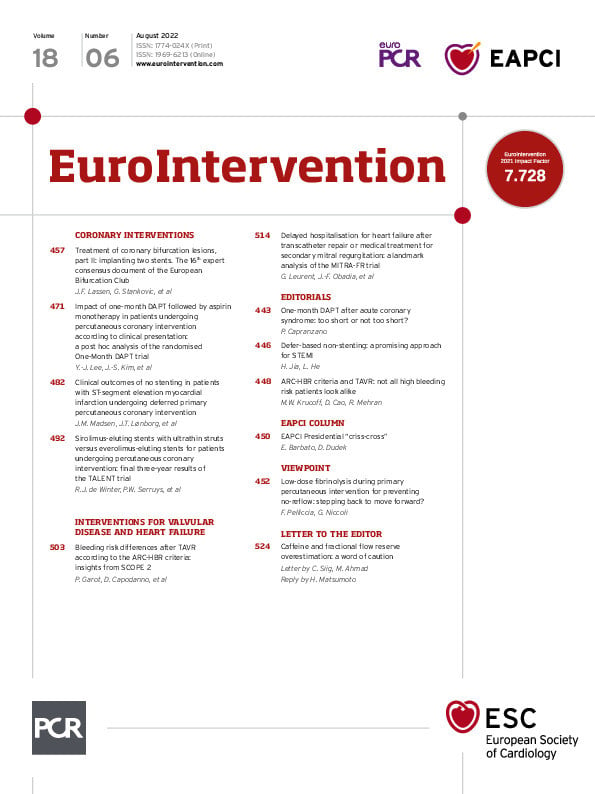The transition between the European Association for Percutaneous Cardiovascular Interventions (EAPCI) 20-22 Board, under the presidency of Prof. Dariusz Dudek, and the 22-24 Board, under the presidency of Prof. Emanuele Barbato, took place this past May in Paris at EuroPCR. This is a consolidated tradition that has taken place for more than 14 years, with a turnover of 8 EAPCI Presidents. The main objective of the event is to report on the results achieved and to reflect on the challenges and opportunities that arose during the most recent term in order to positively inject the incoming Board with new activities, scientific projects, and educational initiatives.
The year 2020 was undoubtedly the “annus horribilis” for our communities, who were faced with an unprecedented challenge that has changed our way of living. The pandemic has heavily impacted health care systems in general and the interventional cardiology community in particular. Consolidated clinical practices were dramatically disrupted, heavily impairing our ability to serve our patients in need of percutaneous cardiovascular interventions. The impact has been further amplified by the complete lack of training and educational activities which has left health care professionals (HCPs) involved daily in interventional cardiology practices with massive unmet needs regarding the improvement and/or preservation of their clinical skills. Needless to say, the highest price has been paid by the younger generations of interventional cardiologists, by the nurses and allied professionals, and by all those HCPs working in emerging countries.
Humankind has always reacted with creative and adaptive solutions to challenges. The pandemic has been no exception to this, and the travel ban has exponentially boosted our ability to organise digital scientific and educational events. In fact, an increasing number of EAPCI and PCR webinars have been delivered online, largely making up for the lack of in-person educational events. The latter, by the way, partially came back in 2021, enabling us to share experiences in a totally new environment. The events, offered in combination with the EuroPCR digital course, provided great opportunities to build strong connections with even the most remote places, and therefore significantly increased inclusivity and engagement. The EAPCI grant program was adapted to these exceptional circumstances, securing a very large number of grants to provide for national fellowships in order to overcome the international travel bans1. The EAPCI has contributed generously to the gathering of scientific data and to providing expert consensus guidance related to percutaneous cardiovascular interventions during the acute period of the pandemic, as well as on how to restore elective interventional programs23.
In addition, the publication of the EAPCI core curriculum on percutaneous cardiovascular interventions provided an important reference for our interventional cardiology community4. We are also thrilled to see EuroIntervention, the official journal of the EAPCI, thriving during uncertain times and reaching an all-time high impact factor of 7.728 (Figure 1).

Figure 1. EuroIntervention 2021 Impact Factor.
This is an incredible success for both EuroIntervention and the EAPCI and we look forward to continuing this strong collaboration and seeing where it will lead us in the future.
In 2022, there seems to be light at the end of the tunnel. The first courses have been organised in a blended format with sessions onsite for all those able to attend and online for the many more who are not able to travel. This format will be both a legacy and an opportunity that the pandemic offered us and will probably remain in place for the future in order to keep our broad interventional cardiology community connected. But despite all efforts, the pandemic has dramatically increased the pre-existing unmet needs and disparities in access to percutaneous cardiovascular interventions.
Therefore, the new mission of the EAPCI will be to warrant Equitable Access to Percutaneous Cardiovascular Interventions, both for patients and for HCPs. EAPCI in partnership with PCR will mean equitable access to education and practice in cardiovascular interventions for all early career HCPs, both men and women, irrespective of their country of origin. More women will be able to serve their communities in leadership positions and be role models for other women wishing to embrace a career in interventional cardiology. Particular attention will be given to our younger community by involving them in their preferred channels of communication, promoting and rewarding their hard work and merit. Mobility between EU countries will be further boosted by offering support for training in other countries as well as facilitating mutual recognition of training for interventional cardiology. And when all this is not feasible, remote training and education will be promoted and offered on more powerful and user-friendly digital platforms.
The EAPCI will mean this and much more to the interventional cardiology community. The baton has been passed! Novel challenges are ahead and will be tackled with renewed enthusiasm and preserved integrity and credibility.
Supplementary data
To read the full content of this article, please download the PDF.

